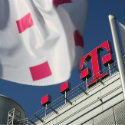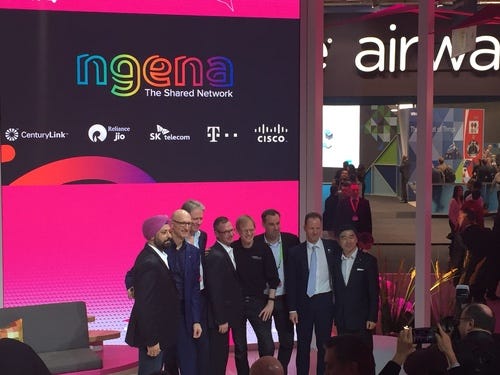DT Plots Pan-Net, 'Answers' B2B OTT Threat
German incumbent takes big step forward on its rollout of a pan-European network and launches alliance to address OTT challenge in the business communications sector.

BARCELONA -- Mobile World Congress 2016 -- Deutsche Telekom has addressed concerns surrounding its plans to build an all-IP, pan-European network, revealing here that it will provide new services across 11 countries from a single data center in Budapest, Hungary, starting this summer. (See DT's Pan-Net Plans Need a Pick-Me-Up.)
Making a series of dramatic network announcements at this week's Mobile World Congress, the German incumbent also unveiled a new operator alliance aimed at combating the threat posed by web-scale players in the enterprise market for fixed-line services.
Addressing reporters at the operator's stand in Barcelona earlier today, DT European chief Claudia Nemat said the Budapest data center would be the first "real production center" based on virtualization and cloudification technologies.
The announcement comes exactly one year after Deutsche Telekom AG (NYSE: DT) outlined its pan-net vision at last year's MWC event. By introducing all-IP technology throughout all of its European networks, the operator plans to shut down many of the platforms on which it provides services in specific countries.
The aim is to have service platforms that cater to a number of markets, allowing Deutsche Telekom to slash expenses and introduce new services more rapidly.
"Today the intelligence for putting new products and services into the network is distributed over more than 10,000 central offices that have vendor-specific combinations," said Nemat. "As a result, it takes too long to introduce new products and services."
Taking increasing advantage of New IP technologies like SDN and NFV, Deutsche Telekom's pan-European network will reduce the number of central offices from about 10,000 today to "just a few across Europe," according to Nemat.
For more NFV-related coverage and insights, check out our dedicated NFV content channel here on Light Reading.
Following year-long trials of IP-VPN and IPTV services in the three markets of Croatia, Hungary and Slovakia, Deutsche Telekom will launch commercial email services from the Budapest facility in the third quarter of this year. "We decided to start with the simple things," said Nemat.
In the fourth quarter, DT will add a cloud CPE and advanced VPN service for its business customers. "We are putting pan-net into real production," Nemat told reporters.
Executives had little to say about the exact cost benefits of the move but have previously indicated that Deutsche Telekom will be able to save about €10 ($11) per customer annually from the all-IP rollout.
In the short term, however, the investment is expected to cost between €30 ($33) and €60 ($66) per customer, depending on the market in question. Deutsche Telekom CEO Timotheus Höttges claims that capital expenditure rose by 20% in 2014 and another 15% in 2015, to around €12 billion ($13 billion), with much of that investment going into the deployment of new fixed-line and mobile access infrastructure.
In the meantime, it seems, some countries will have to wait a while before they can benefit from the new production model.
Deutsche Telekom is trying to complete the all-IP transition by 2018. Although today's update suggests it is on track, if not ahead of schedule, outside Germany, the operator still has plenty of work to do in its home market, where just 31% of fixed lines were IP-based in September last year.
"Germany will follow later because it is more complex and bigger," said Nemat, when commenting on the introduction of pan-net services at home.
Ngena takes shape
Besides announcing plans to launch pan-net services, Deutsche Telekom CEO Timotheus Höttges claimed to have found an answer to the threat of a WhatsApp-like player in the enterprise sector with the formation of a new operator alliance called Ngena.
"There is a lot of criticism from you guys -- you say we are just an infrastructure company and that in the future business communications will go into OTT [over-the-top] services and that there will be at some point in time the WhatsApp for business customers," said Höttges. "We have thought about our answer to that and we call it Ngena."
Figure 1: This Is My Generation  Deutsche Telekom CEO Timotheus Höttges (second from left) with Ngena partners at the operator's MWC stand in Barcelona.
Deutsche Telekom CEO Timotheus Höttges (second from left) with Ngena partners at the operator's MWC stand in Barcelona.
Standing for Next Generation Enterprise Network Alliance, Ngena so far includes US-based CenturyLink Inc. (NYSE: CTL), India's Reliance Jio and South Korea's SK Telecom (Nasdaq: SKM). It plans to use Cisco Systems Inc. (Nasdaq: CSCO) technology to let multinational customers buy fixed-line connectivity from a single source. Its foundation, however, is still subject to merger control clearance, Deutsche Telekom noted in its official statement.
Höttges reckons the current complexity of managing contracts with a multitude of providers is a problem that Ngena can address. "We are gathering the best connectivity from local carriers and putting an IP communications suite on top of that," he said.
Ngena has been set up as a distinct IP service company receiving funding and support from Deutsche Telekom Capital Partners, the operator's venture capital business.
Operator partners would provide their services on a wholesale basis to Ngena, which would handle the relationships with end customers.
Answering questions from reporters, Höttges also indicated that service providers would be able to take ownership stakes in Ngena, with Deutsche Telekom Capital Partners reducing its own shareholding as the partnership grows.
The goal is to launch services for business customers in the first half of 2017, by which stage Deutsche Telekom expects to have signed up a total of 20 partners.
"We are in final negotiations with worldwide carriers who want to join the new alliance," said Höttges.
Quizzed on whether UK incumbent BT Group plc (NYSE: BT; London: BTA) would become involved in the new initiative, the Deutsche Telekom boss also promised to raise the subject with BT CEO Gavin Patterson during this week's show.
Following BT's recently completed £12.5 billion takeover of mobile operator EE -- previously a joint venture between Deutsche Telekom and Orange (NYSE: FTE) -- Deutsche Telekom now holds a 12% stake in BT, making it the company's biggest single shareholder. (See BT, DT Tie-Up Holds All-IP, Cloud Promise.)
Along with other service providers, Deutsche Telekom and BT have seen a growing threat from web-scale giants like Microsoft Corp. (Nasdaq: MSFT) in the enterprise communications market.
Through its Skype for Business service, Microsoft has been steadily encroaching on telco turf and is emerging as one of the world's biggest communications companies in its own right. (See Microsoft Comms Threat to Carriers Is Growing.)
Höttges told reporters today that Ngena would deliver a range of benefits to end customers, including scale, security and convenience. "It's a new answer for business-to-business communications services and how we enable them," he said.
— Iain Morris, 

 , News Editor, Light Reading
, News Editor, Light Reading
About the Author(s)
You May Also Like












